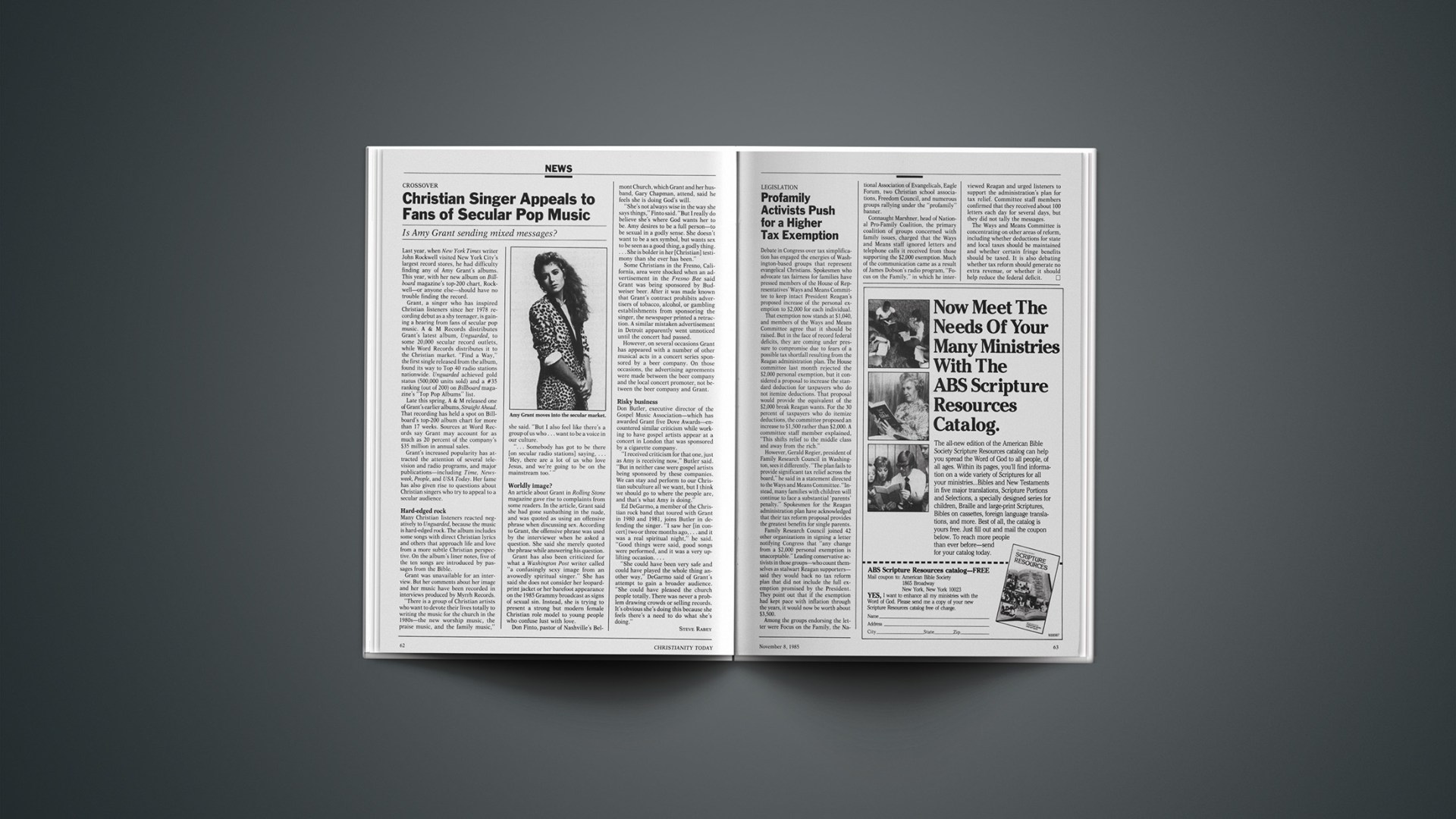Is Amy Grant sending mixed messages?
Last year, when New York Times writer John Rockwell visited New York City’s largest record stores, he had difficulty finding any of Amy Grant’s albums. This year, with her new album on Billboard magazine’s top-200 chart, Rockwell—or anyone else—should have no trouble finding the record.
Grant, a singer who has inspired Christian listeners since her 1978 recording debut as a shy teenager, is gaining a hearing from fans of secular pop music. A & M Records distributes Grant’s latest album, Unguarded, to some 20,000 secular record outlets, while Word Records distributes it to the Christian market. “Find a Way,” the first single released from the album, found its way to Top 40 radio stations nationwide. Unguarded achieved gold status (500,000 units sold) and a #35 ranking (out of 200) on Billboard magazine’s “Top Pop Albums” list.
Late this spring, A & M released one of Grant’s earlier albums, Straight Ahead. That recording has held a spot on Billboard’s top-200 album chart for more than 17 weeks. Sources at Word Records say Grant may account for as much as 20 percent of the company’s $35 million in annual sales.
Grant’s increased popularity has attracted the attention of several television and radio programs, and major publications—including Time, Newsweek, People, and USA Today. Her fame has also given rise to questions about Christian singers who try to appeal to a secular audience.
Hard-Edged Rock
Many Christian listeners reacted negatively to Unguarded, because the music is hard-edged rock. The album includes some songs with direct Christian lyrics and others that approach life and love from a more subtle Christian perspective. On the album’s liner notes, five of the ten songs are introduced by passages from the Bible.
Grant was unavailable for an interview. But her comments about her image and her music have been recorded in interviews produced by Myrrh Records.
“There is a group of Christian artists who want to devote their lives totally to writing the music for the church in the 1980s—the new worship music, the praise music, and the family music,” she said. “But I also feel like there’s a group of us who … want to be a voice in our culture.
“… Somebody has got to be there [on secular radio stations] saying, … ‘Hey, there are a lot of us who love Jesus, and we’re going to be on the mainstream too.’ ”
Worldly Image?
An article about Grant in Rolling Stone magazine gave rise to complaints from some readers. In the article, Grant said she had gone sunbathing in the nude, and was quoted as using an offensive phrase when discussing sex. According to Grant, the offensive phrase was used by the interviewer when he asked a question. She said she merely quoted the phrase while answering his question.
Grant has also been criticized for what a Washington Post writer called “a confusingly sexy image from an avowedly spiritual singer.” She has said she does not consider her leopard-print jacket or her barefoot appearance on the 1985 Grammy broadcast as signs of sexual sin. Instead, she is trying to present a strong but modern female Christian role model to young people who confuse lust with love.
Don Finto, pastor of Nashville’s Belmont Church, which Grant and her husband, Gary Chapman, attend, said he feels she is doing God’s will.
“She’s not always wise in the way she says things,” Finto said. “But I really do believe she’s where God wants her to be. Amy desires to be a full person—to be sexual in a godly sense. She doesn’t want to be a sex symbol, but wants sex to be seen as a good thing, a godly thing.… She is bolder in her [Christian] testimony than she ever has been.”
Some Christians in the Fresno, California, area were shocked when an advertisement in the Fresno Bee said Grant was being sponsored by Budweiser beer. After it was made known that Grant’s contract prohibits advertisers of tobacco, alcohol, or gambling establishments from sponsoring the singer, the newspaper printed a retraction. A similar mistaken advertisement in Detroit apparently went unnoticed until the concert had passed.
However, on several occasions Grant has appeared with a number of other musical acts in a concert series sponsored by a beer company. On those occasions, the advertising agreements were made between the beer company and the local concert promoter, not between the beer company and Grant.
Risky Business
Don Butler, executive director of the Gospel Music Association—which has awarded Grant five Dove Awards—encountered similar criticism while working to have gospel artists appear at a concert in London that was sponsored by a cigarette company.
“I received criticism for that one, just as Amy is receiving now,” Butler said. “But in neither case were gospel artists being sponsored by these companies. We can stay and perform to our Christian subculture all we want, but I think we should go to where the people are, and that’s what Amy is doing.”
Ed DeGarmo, a member of the Christian rock band that toured with Grant in 1980 and 1981, joins Butler in defending the singer. “I saw her [in concert] two or three months ago, … and it was a real spiritual night,” he said. “Good things were said, good songs were performed, and it was a very uplifting occasion.…
“She could have been very safe and could have played the whole thing another way,” DeGarmo said of Grant’s attempt to gain a broader audience. “She could have pleased the church people totally. There was never a problem drawing crowds or selling records. It’s obvious she’s doing this because she feels there’s a need to do what she’s doing.”
STEVE RABEY










